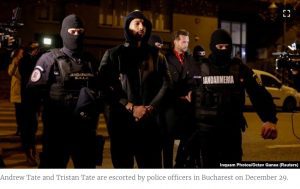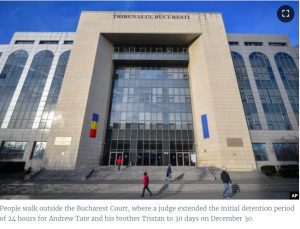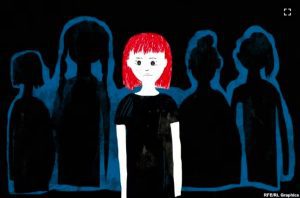While numbers have fallen since Romania established a national agency to combat trafficking in people, authorities continue to register around 30 new victims each month.
The perp walk of influencer Andrew Tate, an online poster child for toxic masculinity, after a raid on his luxury villa outside Bucharest has highlighted the ongoing threat of human trafficking in Romania and the broader region.
Investigators allege that four suspects — purportedly the 36-year-old Tate, his brother Tristan, and two Romanian women — formed a criminal group to traffic individuals in Romania and other countries, including the United States and Britain. The alleged crimes also include rape.
A U.S.-born former kickboxer with British citizenship, Tate has built a multimillion-dollar online brand on the pillars of masculinity, misogyny, and “wealth creation.” Following the arrests, a Bucharest court has ordered the suspects to remain in pretrial custody for at least a month.
Romania’s human- and sex-trafficking problems are unlikely to disappear overnight. While numbers have fallen since the country established a national agency to combat trafficking in people, authorities continue to register around 30 new victims each month. In August 2022, the U.S. State Department credited Romania’s government with “significant efforts” but warned it still “does not fully meet the minimum standards for the elimination of trafficking.”

Romanian police allege that the Tate network ensnared British nationals using the “lover boy” method, in which perpetrators woo victims with the prospect of a loving relationship until they can be forced into abusive situations or slavery.
RFE/RL’s Romanian Service has delved into official data and court testimonies by Romanian trafficking victims to identify several archetypes of people traffickers. It has used pseudonyms for the women to protect their identities.
The Internet Predator
Andreea was born to a poor family and raised in Alba County, in Romania’s historic Transylvania region. She dropped out of school in the second grade and was left in the care of her maternal grandmother soon afterward, when her parents separated and both left in search of opportunity abroad.
Years later, as a 20-year-old, Andreea would testify to her desperate search for a job at home before traveling to Britain with the hope of working at a chocolate factory but ending up as a prostitute.
She testified in court that her guide into the dark world of human trafficking was a man named Sebastian Z. They “met” on Facebook in December 2020. Within just a few conversations, she said, Sebastian had professed his desire to marry Andreea. But there was one condition: She would have to travel with him to Britain, where he would help her find work.
A court psychologist who examined Andreea identified her particular vulnerability as an 18-year-old with little life experience or education. She had no math or reading skills.
Sebastian assured her that he loved her and had a special respect for women, she said, and that he would make her happy and protect her.
She traveled to Britain in January 2020 without telling anyone in her family. She had little more than the clothes she was wearing and a mobile phone as she traveled by bus to Birmingham and then to Wolverhampton, where her “boyfriend” and a friend of his and his wife had a rented home. She was quickly hustled into prostitution to avoid ending up on the streets.
Sebastian created an online alias for her, Andreea said, and “customers would start arriving at 11 in the evening and it would last until about 3 in the morning.”
After two months, she was able to return to Romania after a family member there fell ill. “He told me if I told anyone or the police, he would come and stick a knife in me and kill me,” she testified. But she found the courage to tell her grandmother, who immediately turned to the police.

Sebastian Z and her other captors were eventually sentenced to up to four years in prison.
Romania’s national agency to combat human trafficking says nearly a quarter of all of those who report being trafficked are recruited this way.
‘Lover Boy’
Since the Tates’ arrests, the 19-year-old daughter of a former Romanian legislator has publicly accused them of trying to groom her and her schoolmates with unsolicited, “quite suggestive” phone messages since she was 16.
Daria Gusa said Tate had “basically asked me to go out with him” and applied a similar strategy with other girls or young women in the Ilfov or Prahova areas near his home.
“Basically, it was the ‘lover boy’ method,” she told local media.
She would not have been alone among Romanian women.
In March 2020, Maria began a romantic relationship with the man who would become her tormentor. She thought it was love, and she moved in with him in Giurgiu County, near the Bulgarian border, she later testified, after he promised her the moon and the stars and vowed to marry her.
Two months later, in May 2021, she arrived in a friend’s car in the German city of Nuremberg, where she was expecting to be a homemaker while her fiance worked on a construction site. But she quickly discovered she’d been tricked.
“I stayed in an apartment with two of [my boyfriend’s] colleagues,” she said. “One of them told me to go work at Puff” — a local brothel — “which I did.”
She worked every night, and the “boyfriend” picked her up in the early hours of the morning and took all her earnings. They had frequent arguments, “most of them ending in a fight.”
One night, after she refused any further clients, he came to pick her up and took her home, “where he punched and kicked me until I…passed out.”
Several months after arriving, her first escape attempt failed. The next attempt succeeded after she bought a minibus ticket to Romania with the evening’s earnings. But another woman found out and told her trafficker, and he soon arrived at her mother’s house in Romania. The two reconciled.
Within months, she had agreed to return to Germany to work as a prostitute. In time, she would learn that her “boyfriend” was married to another woman who was also working as a prostitute in Germany.
Investigators concluded that Maria had been emotionally dependent on her abuser and genuinely believed his promises of “love and protection.” They also believed the “boyfriend” had made payments to Maria’s mother. During his prosecution and eventual conviction in connection with the trafficking of other women, Maria continued to try to protect him from justice.
The Acquaintance Or Relative
Diana was a young woman with mental challenges, including a medical diagnosis of bipolar affective disorder. In 2015, she was 22 years old and living in desperate poverty in the Prahova County capital, Ploesti.
An individual with a conviction for pimping in Greece somehow learned about her situation and reached out to her through an uncle. She’d recently lost her identity card and soon her uncle — with money he received from the pimp — helped her get a new one. He also bought her clothes and, eventually, a coveted plane ticket to Britain.
After arriving in Liverpool in August 2015, Diana was picked up at the airport by two men and taken to the Scottish city of Glasgow. Her identification documents were immediately taken away and she was told she was now a prostitute. They recruited her clients via specialist websites. She faced frequent beatings for resisting their instructions.
By October 2015, Diana had mustered the courage and energy to flee. She flagged down the first car that passed by and, crying, told the driver, who called the police. Scottish authorities opened a criminal case that has since been taken over by Romania’s Directorate for the Investigation of Organized Crime and Terrorism (DIICOT).
The Blackmailer
When Elena met her abuser, she was not yet 17. It was early 2020 and the teen had a strained relationship with her parents and was determined to run away from home. That’s when a friend introduced her to a man whom she met one evening, near midnight, for a drink at a gas station in her hometown.
“I started going out with him, talking on the phone — me hiding these things from my parents, including the fact that he had a young child,” she later told investigators. “From the first time we met, I told him that I was 16 1/2 years old, [so that is] something that he always knew.”
Within months, she had agreed to return to Germany to work as a prostitute. In time, she would learn that her “boyfriend” was married to another woman who was also working as a prostitute in Germany.
Investigators concluded that Maria had been emotionally dependent on her abuser and genuinely believed his promises of “love and protection.” They also believed the “boyfriend” had made payments to Maria’s mother. During his prosecution and eventual conviction in connection with the trafficking of other women, Maria continued to try to protect him from justice.
The Acquaintance Or Relative
Diana was a young woman with mental challenges, including a medical diagnosis of bipolar affective disorder. In 2015, she was 22 years old and living in desperate poverty in the Prahova County capital, Ploesti.
An individual with a conviction for pimping in Greece somehow learned about her situation and reached out to her through an uncle. She’d recently lost her identity card and soon her uncle — with money he received from the pimp — helped her get a new one. He also bought her clothes and, eventually, a coveted plane ticket to Britain.
After arriving in Liverpool in August 2015, Diana was picked up at the airport by two men and taken to the Scottish city of Glasgow. Her identification documents were immediately taken away and she was told she was now a prostitute. They recruited her clients via specialist websites. She faced frequent beatings for resisting their instructions.
By October 2015, Diana had mustered the courage and energy to flee. She flagged down the first car that passed by and, crying, told the driver, who called the police. Scottish authorities opened a criminal case that has since been taken over by Romania’s Directorate for the Investigation of Organized Crime and Terrorism (DIICOT).
The Blackmailer
When Elena met her abuser, she was not yet 17. It was early 2020 and the teen had a strained relationship with her parents and was determined to run away from home. That’s when a friend introduced her to a man whom she met one evening, near midnight, for a drink at a gas station in her hometown.
“I started going out with him, talking on the phone — me hiding these things from my parents, including the fact that he had a young child,” she later told investigators. “From the first time we met, I told him that I was 16 1/2 years old, [so that is] something that he always knew.”

At one point, she consented to him filming her while they had sex.
Elena later fled her parents’ home and moved in with the man. Her parents contacted police frequently in an unsuccessful effort to get their daughter home.
The man’s intention was reportedly to take Elena to Germany — to become a prostitute there, it appeared — but her age prevented her from going without her parents’ permission. He shared explicit images of Elena from the video to acquaintances and even members of her family in an effort to coerce their help. Dozens of individuals eventually received images on WhatsApp or Facebook.
Eventually, Elena returned to her parents’ home.
“After learning about that video from my relatives, I soon found out that it was circulating on all the social networks and everyone could see it, which is why I called the police,” her mother told the authorities.
But her parents say the experience marked her for life, including leaving her quiet and constantly depressed enough to attempt suicide, which was averted only because a friend intervened to save her.
